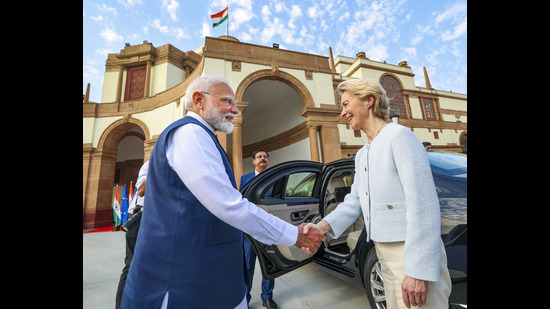Free trade must also be fair trade
India must not accept the European Union's demand on sustainability clauses in FTA
With Donald Trump guillotining the multilateral trading order by first declaring differentiated tariffs on other countries and then announcing that the US will conduct bilateral negotiations to remove them, there are many who are mourning the demise of free trade in the world.

While what is happening today is far from ideal, free trade always had an Orwellian twist of being freer for richer countries. This inequality of opportunity in accessing export markets was achieved through myriad mechanisms other than tariffs which put a prohibitive economic burden on developing countries. These non-tariff barriers (NTBs) have taken multiple forms over the years; sometimes as sanitary and phytosanitary (SPS) measures, sometimes as hefty financial obligations on developing economies in the name of trade facilitation and, in the more recent period, concerns around environmental sustainability.
There is nothing wrong in principle with the purpose which these NTBs seek to serve. But the advanced countries dictating them conveniently forget the point about the historical asymmetry in the development of capitalism which means that today’s “clean” rich countries have exploited these “dirty” opportunities to grow their economic fortunes. The grandstanding over the environment on account of advanced economies is particularly hypocritical because their agro-industrial complexes continue to enjoy a large subsidy despite being heavily carbon intensive. That the global climate accord was far from delivering the financial resources that advanced economies should have given to developing countries for mitigation of the climate crisis even before US President Donald Trump killed the Paris deal only makes the entire thing even more obnoxious.
These entrenched asymmetries, when read with the EU insisting on “sustainability” clauses – HT reported it on Monday – in the ongoing Indo-EU Free Trade Agreement (FTA) negotiations are reason enough for India to not agree to such demands. Ceding to such demands will amount to a double injustice: India being shortchanged in the ongoing bilateral negotiations where its exporters lose market access for not adhering to what are extremely expensive standards, and the largest block of advanced economies unfairly imposing these conditions on a developing economy. The importance of holding back against any such concession in the ongoing Indo-EU FTA negotiations is even more important because it could set a precedent in other ongoing negotiations.
This is not to dismiss the importance of environmental sustainability. It is only to reiterate that free trade must also be fair to be palatable to the entire world.
All Access.
One Subscription.
Get 360° coverage—from daily headlines
to 100 year archives.



HT App & Website







